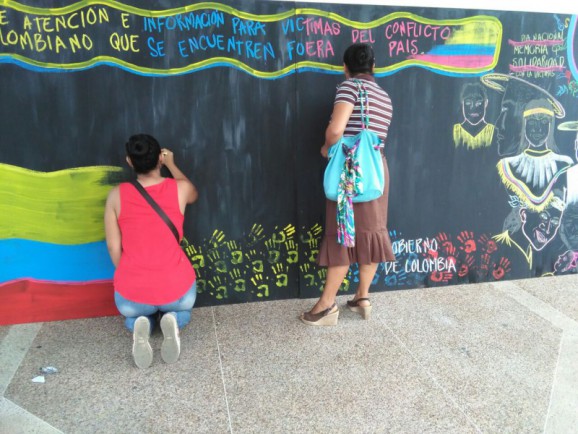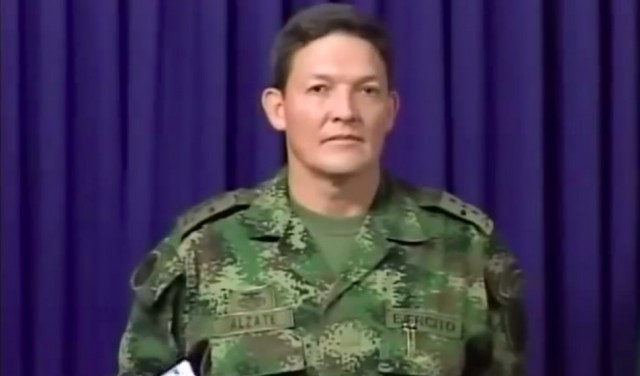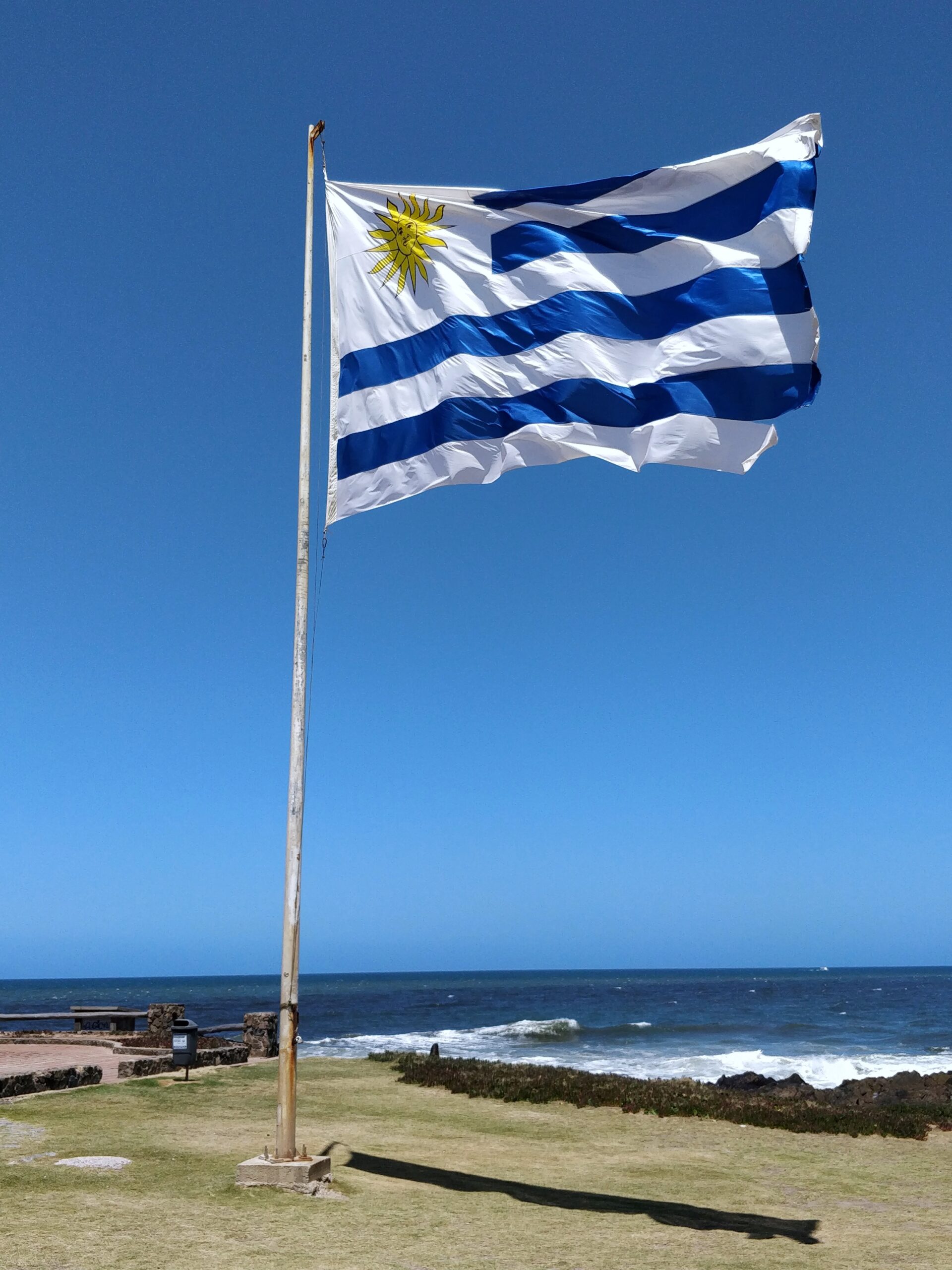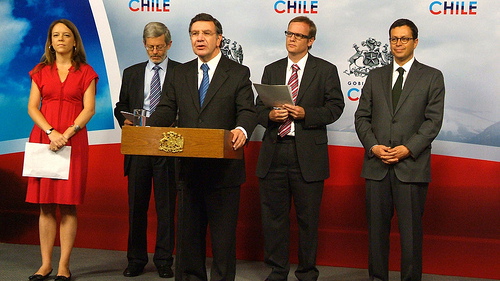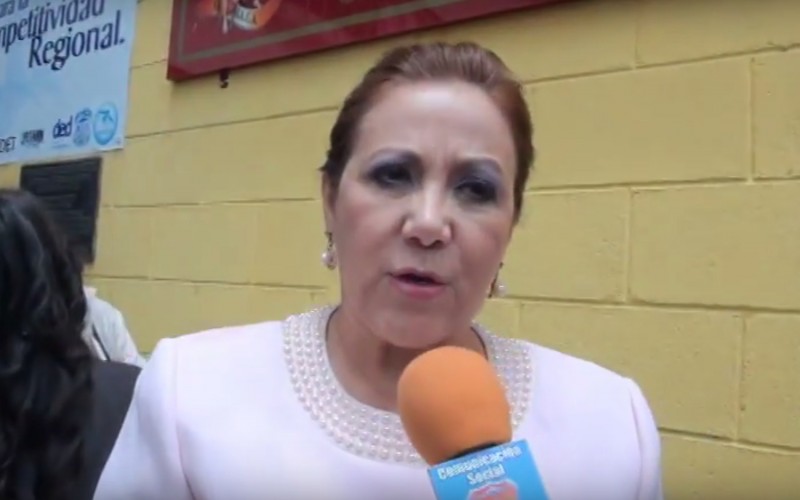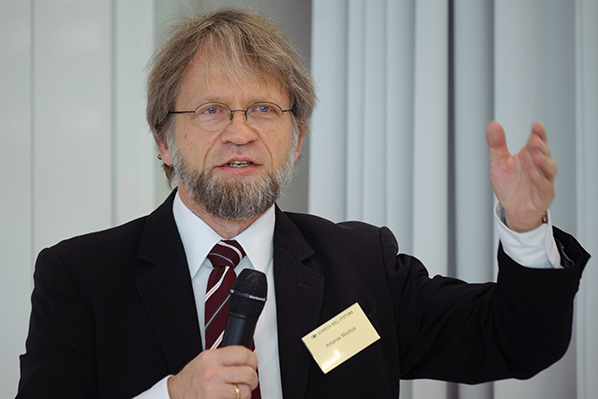
Andes, Colombia, Dispatches, Features, Regions
“We Have to Construct a Taboo Around Killing”: Antanas Mockus On Colombia’s Peace Process
May 10, 2015 By Camila Osorio
Antanas Mockus is one of the most influential figures in Colombian politics. He has been mayor of Bogotá twice, and a presidential candidate three times. He is mostly remembered for promoting art as a way to change cultural values in Colombian society. Or, in his words, to reinforce a “citizenship culture” to reach peace. He is now trying to use art and pedagogy to support the ongoing peace talks between FARC rebels and the Colombian government in Havana to end a 50-year civil war.
Latin America News Dispatch spoke with Mockus in April during a visit to New York University.
Mockus is not an easy interviewee. He talks like a philosopher even though his career has been mostly in politics. But within his complex speech there are many challenging ideas on the importance of the law to end civil war, and what he wants to achieve with his new slogan “Life is Sacred.” This campaign theme is not just a statement about life in Colombia, but about those young people incarcerated in the United States or young males killed in the big cities of Central and South America.
Many people in the United States and Latin America don’t know anything about what you did as mayor of Bogotá and how you tried to reduce violence and provide security in the city through what you call “citizenship culture.” Could you talk a little bit about that?
Well I would have to start by confessing something that is unforgivable. I did not know the Police Code of Bogotá when I started as Mayor. In Colombia, that code is not very well known. And that code defined what small offenses were.
Knowing the code before becoming mayor would have helped me avoid so many clashes in my life. For example, the dog of a next-door neighbor bit my daughter once. And the neighbor decided to hide that dog. If I would have known the code, I would have been aware of my right to demand that the animal be under permanent veterinary supervision. Or, another example can be when somebody spreads sand on a road while repairing a house. The Police Code says that the person who has to clean the street is the one transporting the sand. Not the neighbor and not me. So, there is a game to play. But a lot of people, including the mayor, did not know what that game was.
So, on my first day as mayor I read the Police Code and studied how many offenses were effective for each of the articles in the code.
In Colombia, for example, there are many illegal house constructions. The year before I became mayor, only one of these had been demolished. Of course, demolitions are a very tough sanction, both visually and emotionally: it is horrible to see a house being destroyed by a bulldozer.
So we constructed programs like one named “Pedagogical Constructions.” As the name implies, these were constructions to improve the living conditions of neighborhoods. But these were constructions that also gave the opportunity for people to organize and plan processes. Many young people that grew up among these constructions later became community leaders. It was a space for both living and learning.
What does this have to do with security?
For a long time, very large groups of Colombian society thought that if certain rights were not satisfied, it was valid to claim them through violence. And well, many young people knew that discourse, but didn’t hold on to it. And other young people did stay with that radical discourse. But when the new Colombian constitution was issued in 1991, there was a big consensus in the country about looking forward.
That consensus was done under ideal conditions with three major political forces: the M-19 [left-wing demobilized guerrillas], liberal sectors and conservatives. Those three sides agreed to a new constitution that should serve any of the three in government if they won elections.
As in many other countries, the constituents gave up the possibility of becoming congressmen in that moment. Let’s say, what John Rawls calls “a veil of ignorance,” happened: nobody knew who was going to win the elections. And the three groups legislated thinking about both positions: “I have to evaluate the law I am proposing as if I were the government, but also as if I were a congressman.”
Now, in Colombia there is a tradition of illegality that doesn’t always turn to violence. Although that equilibrium is very delicate, and I would never recommend it as public policy, sometimes you see a strong self-regulation.
Several times, when I used to be the dean of the National University, the university helped to reduce the violence among people trading emeralds. The region where the conflict happened did not become paradise, but we did reduce the number of homicides. So, the human being can find in the law a way to avoid violence. To make that easier, a constitution is needed. And a new environment around the legal obligations of each person.
As you probably know, the mayor becomes mayor the moment he commits to protect the law. So, reducing violence in my city was part of the political mandate I was given by the people. When I commit as mayor to respect the law, I thought particularly about that law that forbids killing. I soon realized that, with the traditional methods, I was not going to achieve that.
I had to think about it for a long time, how to teach that in a pedagogical way, how to make my message go faster and more effectively. And the answer I found was art.
To be more exact, sub-art, which is a variant of art. It is art that is not pretending to be art. It’s like improvised art, art by luck. Art by serendipity, as you would say in English.
Could you give me a more concrete example on how art can be used?
For example, we replaced traffic police with mimes. There were 20 mimes, and they only controlled a small part in Bogotá’s downtown. But TV can be wonderful sometimes, and it made sure the entire city and all the country saw images of the mimes. People saw what we were trying to do. We trusted the mimes instead of the traditional forms of authority based on traditional punishments.
When we announced this measure to journalists, the first question one of them asked was: “Are the mimes going to be able to issue tickets?” And I said: “Of course not, that would be a mess, we would have to train them for that.”
In Colombia, and other Latin American cities, people think only in the first person: “I learn by hook, by fair means, teach me in a good way.” But, at the same time, and this is the most delicate part, we think that the others can only learn the bad way, by crook, by punishing. In other words, people say: “Teach me in a pedagogical way, but teach others by punishing them.” Or as Americans would say: carrots for me, sticks for the rest.
Please explain how this relates to the peace negotiations in Havana. Where would the mimes be in this case?
We need a lot of self-regulation, but also a lot of mutual regulation: that citizens respond adequately to the actions made by others. For example, if somebody throws away a piece a paper, that you pick it up and throw it to the garbage. Or even better: take the piece of paper to the person that dropped it, and say “Sir, you dropped this paper, maybe you need it.”
When people correct people, especially when it comes to small infractions, there are fewer resources spent by the police and the judiciary. Meaning: if I do not self-regulate, and my friend or neighbors did not regulate me, the police and judiciary are needed. But to jump to the police and judiciary as soon as you see an inappropriate behavior is not a good idea.
The United States has been very effective in reducing homicides, but they have four or five times more people incarcerated than the rest of the world per every 100,000 people. So, the sticks have been effective here. But those sticks come at a high price: it is people loosing their lives, or at least, the most beautiful part of their lives. Policies like “three strikes” laws are dramatic and inhuman. You can’t imagine how three infractions could lead to life incarceration.
When we say “Life is Sacred,” it is not only in biological terms. Life is sacred too as a way to have a life project, and the possibility to pursue it in liberty. That people lose liberty, I understand that as a very tough sanction. It might be defensible when the alternative option is death penalties. But it is not acceptable for people to spend all of their lives in prison. There is no evil that could deserve that kind of punishment.
The Colombian constitution prohibits death sentences, and penalties not subject to limitations. Meaning, life imprisonment is not legal in Colombia. And we feel proud of that.
But there is still a lot to be done. The law forbids the death penalty, but it has to be forbidden in the conscience of the people too, in the culture of the people. That nobody has the reflection to even say “this person, they should get a death penalty.”
Societies that apply the death penalty establish an internal border, between what is acceptable and what is radically unacceptable. And that breaks a society in two, between those convicted, and those always innocent.
If we think about Colombia and the peace process, when we talk about convictions, we are talking about the FARC rebels. What kind of punishment should they have? Many survivors demand justice when talking about the FARC’s crimes.
When so much…I know this is ugly an ugly word, but… evil. When there has been so much evil-doing, so much pain… it is not easy to overcome that.
I once presented a paper at an international conference on criminal justice, and one of the participants heard me talk about forgiveness. He then approached me and said: “I just want to give you an example, for you to think about it. I am in Kosovo, and I talk to a woman who tells me everyday she sees the man who killed her husband. And that guy is wearing the same jacket her husband was wearing the day he was killed. So, it might seem like an irrelevant event, but it is incredibly painful for this woman everyday.”
Nevertheless, I still defend forgiveness. Forgiveness is very difficult. The most complex thing about forgiveness is to ask for forgiveness. Because if you ask for forgiveness, you have to accept that the decision is completely in the hands of the other. That person is the one that can decide. I mean, if I tell you: forgive me. Or maybe even: punish me. How do you punish? Well, not forgiving.
In some workshops we did some years ago, a very frequent response that we encountered was people, particularly women, who said: “May god forgive me, but I still have not been able to forgive.”
I know you were organizing a march in support of the peace process, named “March for life.” I was wondering if you were trying to talk about forgiveness then. What was the purpose of those walks?
It is precisely because we are in the middle of a peace process, that we have to learn from the mistakes of the past. And one of the things that was wrong in the past, is that the people who were making peace were murdered. I mean, we can’t expect to make peace and at the same time see a lot of people being killed. So, what we said, was, “Let’s make a march to support life. Let’s trace a border about the limit we should not cross.”
When I talk about borders, I am talking about very strong landmarks. Like, for example, about the rule to not commit incest. Something like that. We want people to never say “kill,” for any reason. Even in language, people saying, “I’ll kill you.” We have to eradicate those kinds of expressions from our language. Not killing, not saying that even as a joke. Not using the killing metaphor. We have to construct a taboo around killing.
The other face of this taboo would be, obviously, the celebration of life. Life is very complex. And it is very beautiful for being so complex. If we were cloned, biologists say, it would not be the same human being that would be divided. On the contrary, all the research made with twins shows that biological copies would tend to become different anyway. When there are two monozygotic twins, one will prefer math, the other literature. The human being is not just biology. The human being has a nature related to language. The human being is in part what it is said to be. And each of us, thanks to language, can construct different life projects. That’s why twins don’t have the same life project, but have very different projects.
That is also why, all the power in the world would never resuscitate the life of a person who was murdered and all the life choices he or she made carefully.
Now, let’s talk about the typical murder in Latin America: a young man, around 24-years-old, male and relatively poor. In America, meaning Latin America and North America, there are more homicides than suicides. In many other parts in the rest of the world there are more suicides than homicides. In Japan, for example, there is one homicide per every 24 suicides. The Japanese has to be protected from himself. In Colombia, for one suicide there are eight murders. The Colombian has to be protected from another fellow Colombian. And this is a very painful reality. Not to say that suicide is better. But it is a bit more decent than homicide.
Let’s backtrack a little bit. You said it is important to learn from other peace processes. I would like you to explain what you learned from other processes, and what makes you think this current peace process is different.
One of the most painful moments during the peace process under former President [Andrés] Pastrana, the Caguán process, is that there was not a serious methodology to work with. People could just add advice, documents and requirements to a commission. But there was not methodology to fix the calendar, the themes, etc. And everybody wanted to hang more and more topics onto the peace process. So, for example, professors wanted better salaries. So, yes, of course the country would be better with better salaries for professors. But also with better salaries for others, like everybody needs better salaries. So, instead of making it easier to sign a peace process, having so many topics on the table to solve made it more difficult. And the other mistake was the FARC cynicism, since they even kidnapped a politician during the peace process, using a highway as a landing strip. So, yes, there was that.
On the other hand, a peace process requires a lot of technical support. Norway and Venezuela have become very important in the current peace process. And today there is a good methodology and a first agreement that was very hard to get to, and which both the government and the FARC had to agree to in secret. The first agreement that says: Colombia will not stop being a democracy. The document they signed says that the constitution is the one Colombia already has. So there are many things that will come, on how to implement the rights of the constitution. But in general, there is an agreement: that we all have to work together to uphold the constitution.
You said so yourself: the peace negotiations have been secret. On the other hand, you need citizens to support the process, and to respect the new norms that will come. But how do you do that when many citizen groups have said they can’t participate in the peace process? How do you solve that?
So, who should make peace is a very complex discussion. But the average citizen can’t contribute a lot. The first step of the process has to be between the government and the FARC. Even if there were a division within the FARC or within the government, that would make an agreement extremely difficult. So we have to make sure that that is not the case right now, and there is unity in both the institutional side and the guerrilla side — which are the two actors that already proved to everybody that they have a great capacity to harm everybody. This is not about proving again what they are capable of. We already know that. We need them to turn the page and move forward.
There is a very wonderful book by John Elster, titled Closing the Books. This is a book about transitional justice, and it shows how in each country, the conditions to reach peace vary a lot. Some countries like Spain implicitly decided that they would not make accountable a lot of people for the atrocities they had committed [during Francisco Franco’s dictatorship]. In Greece, 400 years before Christ, there was a peace in Athens, which was full of hate and judicial retaliations. Meaning, if you had taken property away from me, I could not only demand to have it back, but I could screw you over too. So that peace did not last long. Eight years later, they had to imagine a different peace asking each other, “OK, what is it that you want? What is important for you? What would you not be willing to sacrifice?”
A very good friend of mine, Guillermo Hoyos, used to share this same idea in a very beautiful way: “Tell me everything you need, but don’t ask for miracles.” Some realness is also needed between the parties negotiating. You can’t expect miracles. We need to learn that from different processes, and that was what made civil society participation very distracting in the past.
Now, there is a lot of unease because ELN rebels have not entered the peace process yet. And if they don’t do it quickly, that peace process with them will be on hold. That’s not good since the society is already making a great effort right now during this process. But they have not been responsive to the different invitations made to them to get involved in this peace process.
Why should the ELN participate but not civil society? Because right now what we have to discuss is: will arms be used to make political claims or not? And the government position is clear: no. The peace agreement is about leaving arms and not using war as a political tool. This is what we call establishing a landmark.
About Camila Osorio
Camila is a Colombian reporter based in New York City. She has published her work in The New Republic, WNYC, PRI, the Colombian website La Silla Vacía, among others. She is currently checking facts at The New Yorker.
